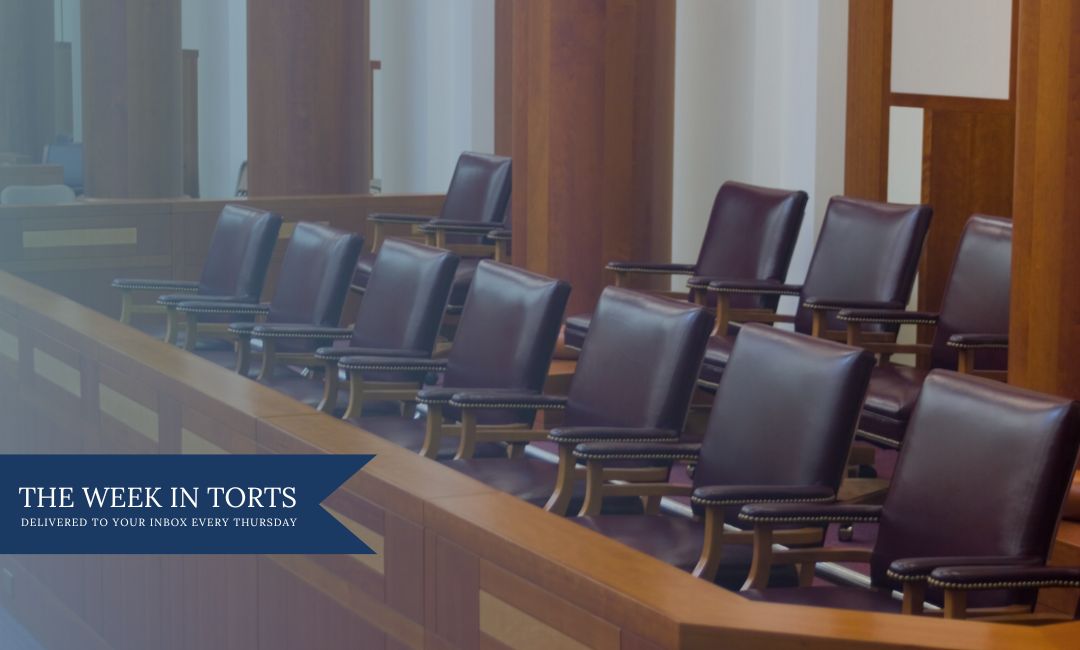The Week In Torts – Cases from January 20, 2023

Don’t ask the jury to send a message!
FLORIDA LAW WEEKLY
VOLUME 48, NUMBER 3
CASES FROM THE WEEK OF JANUARY 20, 2023
VERDICT AND SUMMARY JUDGMENT FOR THE PLAINTIFF OVERTURNED IN A WRONGFUL DEATH CASE AGAINST A PROPERTY OWNER, WHERE THE DECEDENT HVAC TECHNICIAN WAS KILLED AFTER FALLING THROUGH A SKYLIGHT
Martex Corp. v. Artiles, 48 Fla. L. Weekly D132 (Fla. 3d DCA Jan. 11, 2023):
The decedent, and HVAC technician, was killed when he fell through a skylight on the owner of the building’s roof.
The trial court granted summary judgment for the plaintiff, finding that the property owner was liable for the negligence of one of its independent contractor’s employees.
Generally, a property owner who employs an independent contractor to perform work on the property is not liable for injuries caused by the independent contractor’s negligence, subject to two exceptions: (1) when the owner actively participates in the work or exercises direct control over it; or (2) when the owner fails to warn the contractor about concealed dangers not inherent in the work of which the owner had actual or constructive knowledge, and which were unknown to the contractor and could not have been discovered through due care.
In this case, there were fact questions about whether the owner knew or should have known about concealed dangers, namely whether the skylights were potentially not up to code, because it was undisputed that a prior repair of the roof was done without a permit. This factual question should have been resolved by a jury.
Additionally, the court reversed for a new trial based on plaintiff’s violation of a motion in limine, which suggested that the defendant had in fact taken subsequent remedial measures after the accident. The court held that no curative instruction could have ameliorated the expert’s suggestion about these measures.
Finally, in closing, plaintiff’s counsel asked the jury not to render a verdict just for the plaintiffs, but also for “the entire community.” The law prohibits such “send a message language.” There was also reference to 40 years of inspections (but the evidence was that the building was only 28 years old) and counsel compared the situation to the collapse of the Surfside condominium. Other comments (some of which were objected to and some which apparently were not) about public safety in this context, coupled with these statements were improper, and the cumulative effect of these comments on safety negated the fairness of the trial.
AMENDMENTS TO MEDICAL MALPRACTICE PRESUIT SCREENING RULE 1.650
In Re: Amendments to Florida Rules of Civil Procedure 1.070 and 1.650, 48 Fla. L. Weekly S14 (Fla. Jan. 19, 2023):
The Florida Supreme Court issued minor amendments to these two rules. Throughout rule 1.650, references to “notice” were amended to “service of a notice.” Subdivisions (b)(1) and (d)(1) have been amended to reflect that a claimant may serve a notice of intent to initiate litigation by any of the means provided in section 766.106(2)(a); as opposed to service by certified mail only. Subdivision (b)(3) has been amended to provide that if service is challenged in the first response to the complaint, the court must conduct an evidentiary hearing as provided by section 766.102(2)(b)(2).
In rule 1.070, the title of subdivision (d) has been changed from “service by publication” to “service by publication or any other means.”
COMMENTS MADE BY JUDGE AT A POST-SUMMARY JUDGMENT HEARING WHERE NO RULINGS WERE TO BE MADE, MENTIONING APPOINTMENT OF A RECEIVER AND THREAT OF CRIMINAL PROSECUTION, GAVE RISE TO A WELL-FOUNDED FEAR OF BIAS
Hollywood Park Apartments West v. City of Hollywood, 48 Fla. L. Weekly D120 (Fla. 4th DCA Jan. 11, 2023):
The underlying dispute involved the City of Hollywood’s “back billing” apartments for five years of underpayment of water bills, after the city discovered a defective meter had caused it to “underbill.”
A predecessor judge entered summary judgment in the city’s favor permitting the back- billing and accepting the city’s argument that a 2014 amended ordinance provided the method for calculating the unbilled amounts.
The grounds for disqualification arose during a post- summary judgment status hearing. The day before the hearing, the judge considered the apartment’s request for emergency relief to compel the city to reconnect the water supply to 24 of the units. At the status hearing, the judge said that no motions were pending but indicated that she intended to appoint a receiver because she believed the apartments had been collecting rents and included amounts for water, but had failed to pay the city for water. The judge also commented that she wasn’t sure whether she needed to refer the case to the state attorney’s office for review.
To be legally sufficient, a motion to disqualify must demonstrate some actual bias or prejudice so as to create a reasonable fear that a fair trial cannot be had. The fear of bias must be objectively reasonable and not based on the subjective fears of a party.
The court found that the trial judge’s comments at this hearing at which no rulings were to be made included threats of criminal prosecution and a unilateral determination that a receiver should be appointed. Such comments gave rise to a well-founded fear of the judge’s bias, and the court granted the petition.
ATTORNEY’S FEES PROPER WHEN LAWSUIT WAS THE NECESSARY CATALYST TO RESOLVE A CLAIM AND FORCE THE INSURER TO PROCEED
Deitsch v. Certain Underwriters at Lloyds of London, 48 Fla. L. Weekly D131 (Fla. 3rd DCA Jan. 11, 2023):
The trial court denied the insured’s motion for attorneys’ fees. However, the appellate court found that this was not a case where the insureds “raced to the courthouse” to file a lawsuit for an attorneys’ fee award.
Instead, the lawsuit was filed to resolve a legitimate dispute, and the filing of the suit acted as a necessary catalyst to resolve the dispute and force the insurer to satisfy its obligations under the insurance contract.


